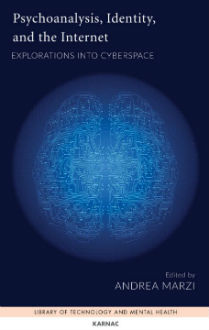
Psychoanalysis, Identity, and the Internet
Explorations into cyberspace
Edited by Andrea Marzi
Karnac
Anno: 2016
![]()
Every day we seek information from the internet, buy something, play videogames, chat, work, and so on. But what exactly is the nature of the space we surf in and through? Is it virtual or real? What is the actual relation between the virtual reality we inhabit more or less in a videogame, or a film, or a common experience on the Internet, and the psychic reality that is one of the main focus of psychoanalysis? What happens to the sense of corporeality, time, and space that we are accustomed to, considered as the vital component of subjective experience? And what happens to the real relationships between people?
The contributors and the articles presented in the book suggest that the main psychoanalytical theories are the most adequate means to understand the nature of the new subjects that appear in the present world on the Internet and cyberspace era. Not only does psychoanalysis read the multifaceted nature of virtual reality, but cyberspace also affects and influences seminal reflections about psychoanalysis itself and the virtual space of the mind. This timely volume, first published in Italian in 2013, explores the consequences of virtual reality in the analytical field and the peculiar characteristics of the encounter with the particular state of mind of internet-addicted patients; it also shows in detail the path of the therapy, psychotherapeutic or analytic, and the path of the analyst with the net-surfer, a castaway in the realm of virtual reality.
Considering all the points of view expressed in the book, cyberspace appears, on the one hand, as a mirror that traps vulnerable people in a pseudo-reality, while on the other hand it appears as a particular dimension which sets creative phantasy free. In either case, this dimension challenges us every day, while spreading out, alluring us, eluding us.
____________________________________________________________________
![]()
Psychoanalysis, Identity, and Internet
Explorations into cyberspace
Karnac
Anno: 2016
In Internet “navighiamo” ogni giorno, entriamo in relazione con gli altri, con i social networks, i blog, con la posta elettronica, con Skype. Su Internet cerchiamo informazioni, facciamo acquisti, giochiamo. Ma in che spazio navighiamo? Di che spazio si tratta? È virtuale o reale? Le sue vie possono essere mappate?
E la realtà virtuale in cui ci immergiamo più o meno completamente, in una simulazione di guida, in un videogioco, vedendo un film in 3D, come si pone rispetto alla realtà psichica di cui si occupa la psicoanalisi? Dove vanno a finire la corporeità, il tempo e lo spazio che siamo abituati a considerare come i pilastri dell’esperienza soggettiva? Dove va a finire la relazione“reale” tra le persone? I contributi ospitati nel libro che Andrea Marzi ha scritto e curato individuano nelle principali teorie psicoanalitiche di oggi gli strumenti adeguati per cogliere le nuove soggettività che si affacciano al mondo attuale, al tempo del cyberspace e di Internet. Non è solo la psicoanalisi che “legge” la sfaccettata natura della realtà virtuale, è anche il cyberspace che stimola, in modo reciproco, riflessioni sulla psicoanalisi e gli “spazi virtuali” della mente. Il volume esplora quindi la natura e le conseguenze della realtà virtuale nel campo analitico e le peculiari caratteristiche dell’incontro con la mente degli “Internet-addicted”, mostrando nel dettaglio i percorsi della cura, analitica o psicoterapica, dell’analista con il “navigatore” smarrito nella realtà virtuale. Se consideriamo il ventaglio dei punti di vista, ad un estremo il cyberspace appare come uno specchio che imprigiona persone vulnerabili, le irretisce in una pseudo-realtà, all’altro estremo è una dimensione che libera la fantasia creativa. In ogni caso, si tratta di una dimensione che ci cimenta ogni giorno, espandendosi, attraendoci, sfuggendoci. E’ una dimensione che la psicoanalisi non può omettere di esplorare.
(tratto dalla quarta di copertina)
Contributi di: Giuseppina Antinucci, Giuseppe Civitarese, Valeria Egidi Morpurgo, Marcus Johns, Marco Longo, Andrea Marzi, David Rosenfeld, Michele G. Sforza, Riccardo Sorrenti.
Andrea Marzi, psichiatra, psicoanalista, dottore di ricerca in deontologia ed etica medica, è membro ordinario della SPI e dell’IPA. Vive e lavora a Siena. Tra i suoi lavori più recenti: Articolazione e peculiarità dell’inter- vento psicoanalitico nella realtà istituzionale (2011), e Realtà psichica e fantasia sociale nella relazione analitica. Spunti clinici sull’aziendalismo interno (2012).
